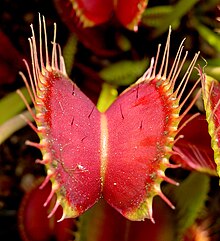Even the New York Times published an article entitled "Noisy Predators Put Plants on Alert, Study Finds".
Such a headline calls into the question the validity of a previous blog here, What a Plant Hears and Chapter 4 of WHAT A PLANT KNOWS where I concluded "in lieu of any hard data to the contrary, we must conclude for now that plants are deaf".
So what's going on here? Is there finally hard data indicating that plants hear?
To really answer this question, one has to read the primary literature, and that is the research paper, "Plants respond to leaf vibrations caused by insect herbivore chewing, that was published recently in Oecologia.
Let's briefly read how the experiment was carried out:
 |
| The green vibrator attached under the leaf |
Chewing vibrations were recorded with laser Doppler vibrometry. To experimentally reproduce the caterpillar feeding vibrations, we used piezoelectric actuators supported under a leaf and attached to the leaf using accelerometer mounting wax." (see picture on right)
In other words, the scientists recorded the vibrations caused by chewing, and then reproduced these vibration with a vibrator attached to the leaf. These physical vibration elicited a chemical response in the plant similar to the chemical response to insect chewing. This is a very interesting finding. But what it shows is the plants respond to physical vibrations induced by being attached to a microvibrator.
So if the popular press insists on bombastic news items, perhaps it would be better to say: "Scientists Find That Plants are Similar to Samantha - They Respond to Vibrators"
